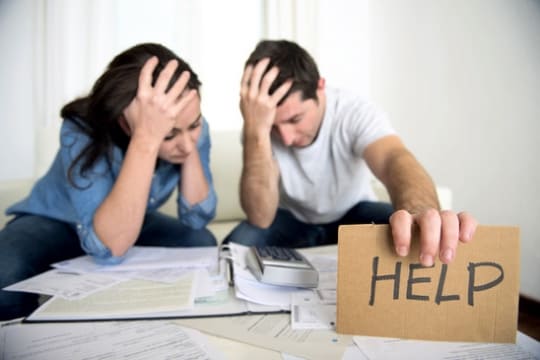Debt is an interesting problem to have. It’s horribly difficult most times to settle your debts. Moreover, that idea that you can just “put it on the credit card and pay later” can be largely misleading. Particularly for young people, it’s easy to accrue tens of thousands of dollars in debt without even noticing. After all, having spending power for the first time in one’s life is like getting power-drunk.
First steps first: Come to terms with your debt
And that doesn’t mean going to Debtors Anonymous and saying “Hello, my name is Peter and I owe money.” Coming to terms with your debt implies calculating exactly how much money you owe, whom you owe it to, and how the interest can be paid
If you’ve never been in debt, you might think this is absurd. But in truth, when people have no money, or worse, when they owe a lot of it, getting a reality check can be a truly scary experience. Many people choose to not look and just pay the least amount on each account. But that won’t get you anywhere, as minimum payments often will barely cover monthly interests, and sometimes not even that. So first things first, face your debt in full. And then decide to make that numbers go down, not up.
Sponsored Listings
Second: Decide, then stick to it.
This plan has several parts. First, your debt (probably) isn’t a single, huge number staring at you like a dragon threatening to eat you. Instead, it’s quite likely made up of dozens of smaller debts of varying amounts, to different organizations or people, and under different terms. So it is necessary to tackle this by organizing your debt.
Then, once you know how your debt is distributed, it’s time to make that plan. Note how much each of them is accruing in interest payments each month. Remember, we want this number to go down, not up, so paying down the interest is a wise take. Then, make a priority list.
Since your entire debt arose separately, you’ll find that some can either be paid more quickly, either accruing huge amounts of interests or are relatively harmless, with small interest rates. This is important. The more any debt is accruing interest each month, the more important it is to focus on it. Just as well, smaller debts might be smart to pay off simply to completely eliminate them from your sheet in earnest.
It might also be smart to allow some of these to accrue interests by just paying minimums. A smaller debt with a 2% interest rate, after all, won’t hurt you financially as much as leaving a larger debt on 12% interests go unpaid. So prioritize. A debt that makes you poorer each day should take the lead, and the other ones can wait (but do pay minimums, defaulting might make things worse.)
Another option you need to use if you owe money to a bank is to make contact. Banks have financial planners on the payroll, and they are generally interested in you paying your debt. So having a talk with bank employee could help you both strike a deal and get professional aid in settling your accounts. Also, if the loans you have are on particularly bad terms, refinancing them might help you pay them off.
Third: Don’t accrue more debt.
That credit card? Put it in a box, inside another box, inside a locked chest, inside a locked container, inside a ship, then allow it sink to the bottom of the Mariana Trench. Paying off your debt won’t work if you’re also getting into more debt, so, stop it. This might mean changing your lifestyle – reducing or eliminating nights out, eating at home often, buying cheaper brands, staying away from new clothes, and so on. Moving to a cheaper place might also be necessary.
In many cases, when people accrue huge debts without noticing, it’s because of unsustainable lifestyles. We see this happen to celebrities all the time, and it’s the main reason they go bankrupt. It also happens to regular people, since you don’t need to be eating caviar and popping a bottle of champagne every night to accrue debt. You just need to be living beyond your means.
Sometimes, however, just cutting off superfluous expenses might not be enough. In that case, you’ll need to go to step four.
Fourth: Earn enough money.
Simple, right? You can’t pay off a debt if you aren’t earning enough money to cover the charges and at least some of the original debt. So for any of the above to work, you need to make sure you’re earning enough.
Earning enough can mean different things. It can mean getting a side job for some extra income, for example. Even if it’s a small gig at Fiverr, performing two or three quick tasks a day will amount to a few hundred dollars by the end of the month. It could mean getting another job, which many do, and using all the money from that job to pay your debts.
It doesn’t need to imply working more all the time. Having a chat with your boss about your financial situation and salary can actually help, depending on your organization. Sometimes this might lead to a salary increase if you’re a valued member of your company. Other times, the company might offer to pay your loan or part of it, and then discount some money from your paycheck with lesser or no interests. It might also end up being worthless, but there’s nothing to lose by trying.
The third option you have is… selling some of your stuff. Now, selling your things won’t work long term, since once you sell something once, you really can’t sell it again. You need to know that the trick here is selling enough stuff to earn enough cash so you can pay off enough of your debts. You probably won’t pay off your whole debts by selling your possessions, but you might be able to pay a third of them by doing so – which will, in turn, lower your monthly interest expenses and making it more manageable.
Last Words
For most people, these are the common steps to get out of debt. There are, of course, special cases where you might want to look into financing programs offered by your local government, company, banks, or non-profit organizations. For example, medical bills can be difficult enough to pay to qualify you for certain aid programs, depending on where you live.
When faced with the choice between helping you manage your debt and you defaulting on it, many lenders will choose the former. So, if you have the chance, use it. And if it all fails, there’s always bankruptcy. But ideally, you’ll want to avoid that, as getting any credit afterwards can be very difficult in the long run.
Disclaimer: Our service is not intended to be, nor should it be construed as financial advice. We help our readers make informed decisions via impartial information and guides. Where appropriate, we may introduce partner companies who can provide services relating to financial products.









